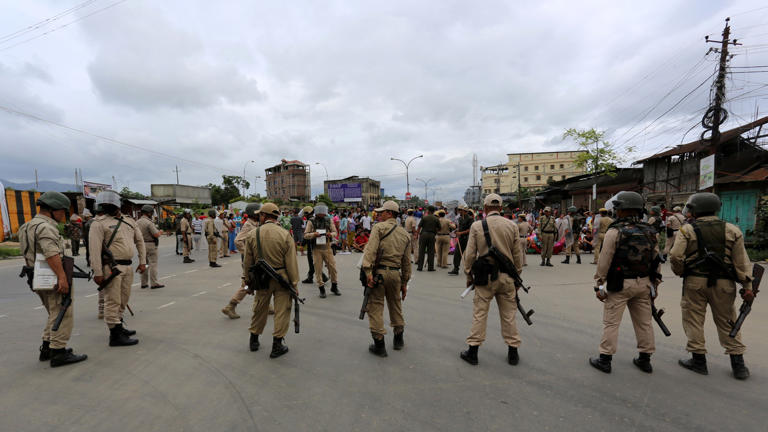Manipur, one of India’s northeastern states, remains on edge as fresh violence erupted, leading to the death of five people in Jiribam district on Monday. This comes just a day after an alarming incident in the conflict-ridden Bishnupur district, where rockets were fired, further escalating tensions between the warring communities. The persistent clashes have plunged the state into chaos, fueling fears of deeper ethnic divides and widespread unrest.
Chronology of Events
On Sunday, Bishnupur district experienced an intense skirmish that saw the firing of rockets and heavy artillery, which resulted in significant damage to homes and public property. The violence was linked to ongoing tensions between the majority Meitei community and the Kuki tribal groups, both of whom have been in conflict since May. This recent escalation in Jiribam, located near the Assam-Manipur border, saw armed groups attacking villages, resulting in the deaths of five individuals.
According to local sources, the violence began when a group of unidentified gunmen targeted a village predominantly inhabited by the Kuki community. Reports suggest that the attack was well-coordinated, with gunmen infiltrating from surrounding forests and launching a barrage of gunfire on unsuspecting villagers. While the state security forces arrived on the scene to restore order, the damage was already done, leaving five dead and several others injured.
The spate of violence has raised concerns that Manipur is on the brink of a larger ethnic conflict. Clashes between the Meitei and Kuki communities have left scores dead and displaced thousands over the past few months, straining the resources of the local administration and security forces.
The Conflict’s Roots
The conflict between the Meitei and Kuki communities in Manipur has deep-seated roots. Historically, the Meiteis, who are primarily Hindu, reside in the Imphal Valley, which accounts for about 10% of the state’s area but hosts over 60% of its population. The Kukis, predominantly Christians, and the Nagas, another tribal group, live in the hill districts surrounding the valley.
Tensions began to rise in May 2024 when the state’s High Court issued an order recommending the inclusion of the Meitei community in the Scheduled Tribe (ST) category. The Meiteis, though numerically dominant and socio-economically influential, were seeking ST status to secure land and job reservations, which are currently primarily reserved for tribal communities such as the Kukis and Nagas.
This demand was met with fierce resistance from the Kuki community, who felt that granting ST status to the Meiteis would threaten their rights, culture, and access to land in the hill regions. What began as a legal and political dispute quickly spiraled into violence, with arson, looting, and gunfights breaking out across various districts.
The state has since been gripped by intermittent clashes, with armed insurgent groups exploiting the situation, exacerbating violence and making the restoration of peace an uphill task for the administration.
Government Response
In response to the fresh violence, Manipur Chief Minister N. Biren Singh condemned the attacks and urged calm among the state’s citizens. He reassured the public that additional security forces would be deployed to the affected areas to restore peace and prevent further violence.
“The situation in Jiribam is being closely monitored. Security has been beefed up, and investigations are underway to bring the perpetrators to justice. The government will not tolerate any form of violence, and I appeal to all communities to maintain peace and harmony,” Singh said in a public statement.
The Union Home Ministry has also taken note of the situation, with reports suggesting that Union Home Minister Amit Shah has been briefed on the developments. Sources indicate that the central government may consider sending additional paramilitary forces to Manipur, although no official confirmation has been made.
Fear and Uncertainty Among Citizens
As violence spreads across Manipur, fear and uncertainty loom large over its residents. Displacement camps are swelling with families who have fled their homes to escape the violence. Schools, businesses, and essential services have come to a standstill in several affected districts, with daily life becoming increasingly untenable for many.
Civilians have found themselves caught in the crossfire between the rival factions and insurgent groups. The use of sophisticated weaponry, such as the rockets fired in Bishnupur, has only added to the public’s anxiety, signaling that the conflict is becoming more militarized.
Local humanitarian organizations and civil society groups have been vocal in their calls for peace, urging both the state and central governments to take decisive action to quell the violence. They have also demanded justice for the victims and called for dialogue between the conflicting communities to address the underlying issues.
Outlook
With five more lives lost and no immediate resolution in sight, Manipur remains a state teetering on the brink. While the government’s commitment to peace is evident, the situation on the ground is volatile and unpredictable. The path to reconciliation will require sustained efforts at dialogue, a focus on addressing the grievances of both communities, and a concerted push to root out insurgent elements that are further destabilizing the region.
As Manipur mourns its dead, the hope for peace remains distant, but not impossible.

